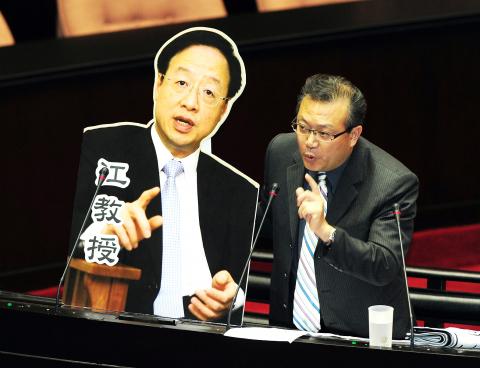After obstructing proceedings on the legislative floor on April 25 and on Tuesday, the Democratic Progressive Party (DPP) yesterday agreed to refer the draft bill for a special statute on a referendum on the Fourth Nuclear Power Plant to a standing committee for deliberation, rather than a direct second reading on the legislative floor.
As the Chinese Nationalist Party (KMT) continues to insist that the government’s resolution to suspend the construction of the plant in New Taipei City’s Gongliao District (貢寮) is not a major policy change and thereby refuses the DPP’s request that Premier Jiang Yi-huah (江宜樺) deliver a special report on the issue to the legislature, a cross-party negotiation again failed to reach a consensus.
Following the DPP’s compromise to add the budget report on the powser plant to the agenda of next Wednesday’s Economics Committee meeting, Jiang took to the podium for a question-and-answer session yesterday.

Photo: Lo Pei-der, Taipei Times
DPP Legislator Wu Ping-jui (吳秉叡) said the Executive Yuan would need to elucidate on the plant’s budget “for the controversy to come to an official end.”
KMT caucus whip Lin Hung-chih (林鴻池) said the ruling party had been clear that construction at the plant is to “be suspended and the No. 1 reactor sealed” and that the DPP could question the premier during the question-and-answer session instead of requiring a special report.
DPP Legislator Su Chen-ching (蘇震清) called the Executive Yuan’s talk of “concession” into question, saying that if its resolution is not a major policy change, but merely “one that follows the conclusion reached by a cross-party negotiation in the legislature in February” as Jiang has said, “how is this a concession made on the part of the government?”
Jiang said that the difference lies in the time frame for a possible referendum. While the negotiation considered the possibility of a referendum being held immediately after the safety inspection is completed, “the latest resolution has decided to seal the No. 1 reactor in order to wait for a possible referendum in the future.”
The cross-party negotiation concluded that no additional budget would be added for the fuel rods to be inserted until a referendum has been held, he said.
Both Su and DPP Legislator Chiu Yi-ying (邱議瑩) also brought up the fact that Jiang had refused to vote in a referendum on the issue of arms procurement in 2004.
As the nation’s existing regulations on referendums require the participation of half of eligible voters for it to be valid, mobilizing people not to vote can be a convenient way to veto the proposition proposed. How the proposition is phrased, as in affirmative or negative statement, can be decisive, they said.
Jiang said he did not vote in 2004 because he believed the referendum, as well as the proposition, was “nonsense.”
Chiu said Jiang’s refusal to vote exemplified the problem of the existing referendum threshold, by which a referendum can be easily manipulated.
DPP Legislator Pan Men-an (潘孟安) asked Jiang about the possibility of differentiating referendums on the constitutional level from those pertaining to public policies.
Jiang said that the referendum prerequisites for controversies on the constitutional level “are even more rigorous” and said that the issue of the threshold could be discussed for a local referendum, but that the restrictions for a national referendum should not be relaxed.

Taiwanese were praised for their composure after a video filmed by Taiwanese tourists capturing the moment a magnitude 7.5 earthquake struck Japan’s Aomori Prefecture went viral on social media. The video shows a hotel room shaking violently amid Monday’s quake, with objects falling to the ground. Two Taiwanese began filming with their mobile phones, while two others held the sides of a TV to prevent it from falling. When the shaking stopped, the pair calmly took down the TV and laid it flat on a tatami mat, the video shows. The video also captured the group talking about the safety of their companions bathing

US climber Alex Honnold is to attempt to scale Taipei 101 without a rope and harness in a live Netflix special on Jan. 24, the streaming platform announced on Wednesday. Accounting for the time difference, the two-hour broadcast of Honnold’s climb, called Skyscraper Live, is to air on Jan. 23 in the US, Netflix said in a statement. Honnold, 40, was the first person ever to free solo climb the 900m El Capitan rock formation in Yosemite National Park — a feat that was recorded and later made into the 2018 documentary film Free Solo. Netflix previewed Skyscraper Live in October, after videos

Starting on Jan. 1, YouBike riders must have insurance to use the service, and a six-month trial of NT$5 coupons under certain conditions would be implemented to balance bike shortages, a joint statement from transportation departments across Taipei, New Taipei City and Taoyuan announced yesterday. The rental bike system operator said that coupons would be offered to riders to rent bikes from full stations, for riders who take out an electric-assisted bike from a full station, and for riders who return a bike to an empty station. All riders with YouBike accounts are automatically eligible for the program, and each membership account

A classified Pentagon-produced, multiyear assessment — the Overmatch brief — highlighted unreported Chinese capabilities to destroy US military assets and identified US supply chain choke points, painting a disturbing picture of waning US military might, a New York Times editorial published on Monday said. US Secretary of Defense Pete Hegseth’s comments in November last year that “we lose every time” in Pentagon-conducted war games pitting the US against China further highlighted the uncertainty about the US’ capability to intervene in the event of a Chinese invasion of Taiwan. “It shows the Pentagon’s overreliance on expensive, vulnerable weapons as adversaries field cheap, technologically